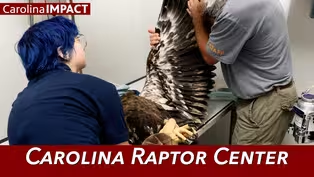
CPCC Programs Meet the Demand
Clip: Season 11 Episode 1121 | 5m 38sVideo has Closed Captions
A local college is expanding programs to meet the demand for healthcare professionals.
According to the American Hospital Association, about 100,000 registered nurses left the workforce during the past two years due to stress, burnout, and retirements. More than 600,000 report they plan to leave by 2027. We show you how Central Piedmont Community College plans to help meet the demand for healthcare professionals. CPCC Programs Meet the Demand, only on Carolina Impact.
Problems playing video? | Closed Captioning Feedback
Problems playing video? | Closed Captioning Feedback
Carolina Impact is a local public television program presented by PBS Charlotte

CPCC Programs Meet the Demand
Clip: Season 11 Episode 1121 | 5m 38sVideo has Closed Captions
According to the American Hospital Association, about 100,000 registered nurses left the workforce during the past two years due to stress, burnout, and retirements. More than 600,000 report they plan to leave by 2027. We show you how Central Piedmont Community College plans to help meet the demand for healthcare professionals. CPCC Programs Meet the Demand, only on Carolina Impact.
Problems playing video? | Closed Captioning Feedback
How to Watch Carolina Impact
Carolina Impact is available to stream on pbs.org and the free PBS App, available on iPhone, Apple TV, Android TV, Android smartphones, Amazon Fire TV, Amazon Fire Tablet, Roku, Samsung Smart TV, and Vizio.

Introducing PBS Charlotte Passport
Now you can stream more of your favorite PBS shows including Masterpiece, NOVA, Nature, Great British Baking Show and many more — online and in the PBS Video app.Providing Support for PBS.org
Learn Moreabout PBS online sponsorship(gentle music) (door knocks) - Good morning, Ms. Jocelyn.
How are you?
- [Dara] It's another day in simulation for nursing students, Christian Wilson and Alexandria Gerard.
- Okay, very good.
And are you feeling short of breath right now?
- [Dara] Speaking to and caring for a mannequin, they act out a hospital scenario that's designed to prepare them for the real world.
- There are adverse events that happen because it can happen like that.
And this is without putting us in the direct line of fire.
This is the best experience that we can have.
- [Dara] Hands-on Experience like this is a crucial part of Central Piedmont's Associate nursing degree program.
- We make sure that they know how to do certain skills before they go into the hospital facilities, and then they actually get to take care of patients from first semester all the way through fourth semester.
- [Dara] Department chair.
Melanie Colson, tells me, "This is important because after graduation, students are walking into an industry that's still facing a nationwide nursing shortage."
- It has a lot to do with a lot of our older population of nurses retiring.
It has a lot to do with COVID, and the impact that COVID had on nurses, a lot of nurse burnout.
- [Dara] One of the ways Central Piedmont is trying to help meet the demand for nurses is by adding an accelerated 15-month nursing program that launches this summer.
- It's providing them the same education.
It's just compressed to a shorter period of time.
So, you know, we look for certain specifics of those that are more academically capable to do that fast-paced program.
- [Dara] They're also starting, a 12-month licensed practical nurse to registered nurse bridge program next year.
- It makes me kind of feel more comfortable, entering the workforce because I know there's such a tremendous need for nurses.
I think that that eases my concerns about being able to find a job because it's so needed right now.
- [Dara] Inside the same building on Central Campus, you'll find students dressed in full personal protective equipment gear, working diligently, the new sterile processing program.
(water sloshing) - The main goal of the department is to get the instruments for surgery clean and sterile for the patient.
So it's an extremely important job.
They're all infection preventionists, so to speak.
- [Dara] Instructor Lana Haecherl says, "Their inaugural class has learned a lot about their field in a short time."
- We're starting out with the classroom didactics, an eight to nine week program.
Once they get done with the classroom didactics, they'll have a module where there'll be 200 hours of clinical, and then another module with 200 more hours of clinical.
- [Dara] Similar to nursing, there's a shortage in this industry too.
- There are significant vacancies in this field, not only in the Charlotte market, but across the United States.
and trying to get students through a program that's comprehensive, that includes clinical experience is very difficult.
- [Dara] Haecherl tells me, "The nature of the job is contributing to shortages."
- Sterile processing is a hard job.
It's very physical job.
Up until recently, it wasn't really considered a profession, it was a job.
Most sterile processing departments, if you go into a hospital today, they're in the basement.
They don't have beautiful windows to look out.
It's not a job where you get a lot of accolades.
- [Dara] Research from the US Bureau of Labor Statistics, shows that the average salary for registered nurses in North Carolina is over $77,000 a year, for medical equipment preparers, it's under 40,000.
For student, Lori Bagley, the reality of the job hasn't deterred her.
- I really like how it's a hands-on thing.
I like working with my hands.
I like being able to manipulate and understand just how something works.
- [Dara] Central Piedmont has another hands-on program.
- You can just leave her foot on the table, and then dorsiflex up from the pad.
- [Dara] The massage therapy program gives students a chance to work one-on-one with each other.
Although it looks like pure relaxation, they're learning vital techniques.
- So our students do spend plenty of time in our anatomy and kinesiology classes, learning all about the body, the bones and the muscles.
And then the art of massage would be working hands-on, and learning different modalities of massage therapy, starting with Swedish and working their way into neuromuscular therapy.
- [Dara] The nine-month certificate program, prepares them for the next step.
- We have aligned our curriculum with the North Carolina Board of Massage and Body Work Therapy requirements, so our students are fully ready upon graduation to obtain their license.
- [Dara] Once graduates get their license, they can enter the workforce, one that desperately needs them.
- In the Charlotte area, this would be a high-demand career.
We are absolutely seeing a lot of employers looking for therapists every day.
So this is something that would be an easy-to-fill job for the Charlotte market.
- [Dara] The average salary in North Carolina is just over $63,000 a year.
The students we spoke with tell us they feel more than ready to conquer the workforce after graduation.
For Carolina Impact, I'm Dara Khaalid.
Video has Closed Captions
Clip: S11 Ep1121 | 5m 47s | A look at the family history of local business Autobell, founded in 1969. (5m 47s)
Video has Closed Captions
Clip: S11 Ep1121 | 5m 35s | A local center serves as a sanctuary for recovering birds from around the world. (5m 35s)
The Montgomery Store Bluegrass Jam
Video has Closed Captions
Clip: S11 Ep1121 | 4m 44s | Learn about the Montgomery Store Bluegrass Jam in Gold Hill. (4m 44s)
Preview: S11 Ep1121 | 30s | Programs Meet the Demand, Autobell, The Raptor Center, & Montgomery Store Bluegrass Jam. (30s)
Providing Support for PBS.org
Learn Moreabout PBS online sponsorship
- News and Public Affairs

Top journalists deliver compelling original analysis of the hour's headlines.

- News and Public Affairs

FRONTLINE is investigative journalism that questions, explains and changes our world.












Support for PBS provided by:
Carolina Impact is a local public television program presented by PBS Charlotte



